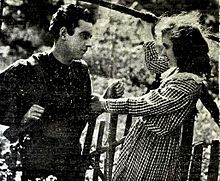When Bearcat Went Dry
| When Bearcat Went Dry | |
|---|---|
 Still with Bernard J. Durning and Vangie Valentine | |
| Directed by | Oliver L. Sellers |
| Based on | When Bearcat Went Dry by Charles Neville Buck |
| Starring | Ed Brady Lon Chaney Bernard J. Durning |
| Cinematography | Jack MacKenzie |
Production company | Charles R. McCauley Photoplays |
| Distributed by | World Film |
Release date |
|
Running time | 6 reels |
| Country | United States |
| Language | Silent (English intertitles) |
When Bearcat Went Dry is a 1919 American silent drama film directed by Oliver L. Sellers from the novel by Charles Neville Buck, and starring Lon Chaney as Kindard Powers.[1] The title refers to a character nicknamed "Bearcat" (Bernard J. Durning) who promises his girlfriend that he will quit drinking liquor. It was considered to be a lost film until a print with Dutch intertitles came to light in a private collection in 1996.[citation needed]
Plot
Turner Stacy is a wild young man known as "Bearcat" living in the Cumberland Mountains of Kentucky. Bearcat casts his eye on Blossom Fulkerson whom he promises he will give up drinking. When Bearcat returns home he find Blossom with Jerry Henderson who works in a railroad and Bearcat soon hates him thereafter. A group of mountain men led by the brutish Kindard Powers attack Henderson mistaking him for an officer. The wounded Henderson is rescued by Bearcat after Powers and his men attempt to attack again. Bearcat forces Blossom to marry Henderson but Henderson dies soon after and Bearcat wants to get rid of Powers once and for all. After Bearcat's father is released from prison he attacks and kills Powers. Bearcat and Blossom then marry in the end.
Cast
- Bernard J. Durning as Turner "Bearcat" Stacy
- Ed Brady as Rattler Webb
- Lon Chaney as Kindard Powers
- Winter Hall as Lone Stacy
- Vangie Valentine as Blossom Fulkerson
- Walt Whitman as Joel Fulkerson
- Millard K. Wilson as Jerry Henderson (credited as M. K. Wilson)
Production
The plot involving a promise to give up drinking was timely given the passage of the Wartime Prohibition Act, which took effect on June 30, 1919, and banned the sale of alcoholic beverages, and ratification of the Eighteenth Amendment to the United States Constitution in January of the same year.
References
External links
